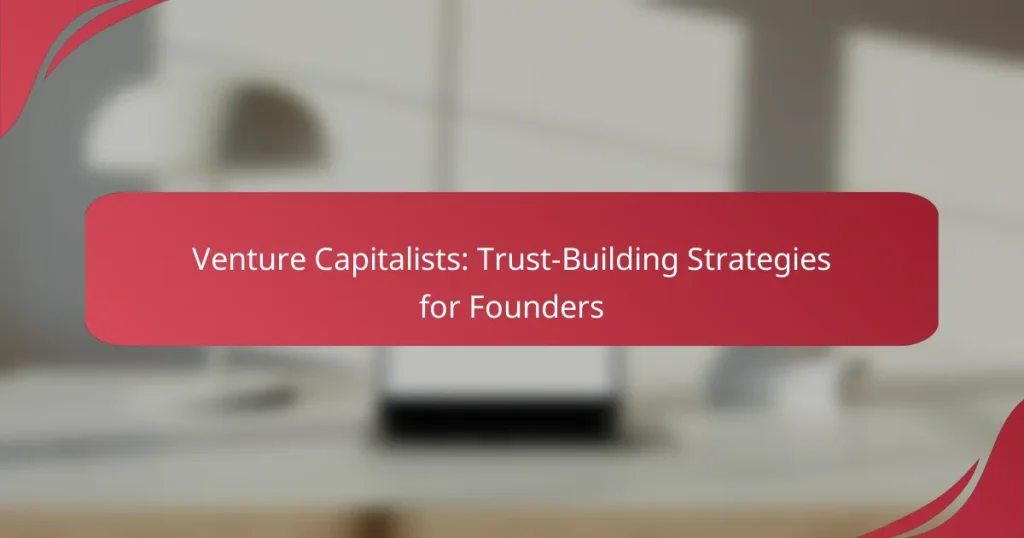Building trust with venture capitalists is essential for founders seeking successful partnerships. By fostering open communication, demonstrating industry expertise, and maintaining transparency, founders can create a reliable foundation that enhances relationships with investors. These trust-building strategies not only establish credibility but also align goals for long-term success.

How can founders build trust with venture capitalists?
Founders can build trust with venture capitalists by fostering open and honest relationships, demonstrating their industry knowledge, and establishing credibility through referrals. These strategies create a foundation of reliability and confidence that is essential for successful partnerships.
Transparent communication
Transparent communication is crucial for building trust with venture capitalists. Founders should share both successes and challenges openly, providing regular updates on business progress and financial health. This honesty helps to establish a strong rapport and reassures investors about the management of their funds.
To enhance transparency, consider implementing structured communication methods, such as monthly reports or quarterly meetings. This consistency allows investors to stay informed and engaged, fostering a sense of partnership.
Demonstrating expertise
Founders can build trust by showcasing their expertise in their industry. This can be achieved through thought leadership, such as writing articles, speaking at conferences, or participating in industry panels. By positioning themselves as knowledgeable leaders, founders can instill confidence in their ability to navigate challenges.
Additionally, sharing insights about market trends and competitive analysis can further demonstrate a founder’s understanding of the business landscape. This not only reassures investors but also highlights the founder’s commitment to the venture’s success.
Establishing credibility through referrals
Establishing credibility through referrals is an effective strategy for gaining the trust of venture capitalists. Founders should seek endorsements from respected industry figures or previous investors who can vouch for their capabilities and integrity. These referrals can significantly enhance a founder’s reputation and appeal.
Networking within the industry to build relationships with potential referrers is essential. Attending industry events, joining relevant associations, and leveraging social media platforms can help founders connect with influential individuals who may provide valuable recommendations.

What trust-building strategies are effective in the US?
Effective trust-building strategies for founders in the US include maintaining transparency through regular updates and fostering communication by engaging in active listening. These approaches can enhance relationships with venture capitalists and create a foundation of mutual respect and understanding.
Regular updates on progress
Providing regular updates on progress is crucial for building trust with venture capitalists. These updates should include key milestones, challenges faced, and how the team is addressing them. Aim for a frequency that keeps investors informed without overwhelming them, such as monthly or quarterly reports.
When sharing updates, be clear and concise. Use bullet points or a simple dashboard to highlight essential metrics like revenue growth, user acquisition, and product development. This transparency helps investors feel involved and reassured about their investment.
Engaging in active listening
Engaging in active listening is vital for fostering a trusting relationship with venture capitalists. This means not only hearing their feedback but also demonstrating that you value their insights by incorporating them into your strategy. Schedule regular check-ins to discuss their thoughts and concerns.
During conversations, show that you are listening by summarizing their points and asking clarifying questions. This practice not only builds rapport but also ensures that both parties are aligned on expectations and goals, ultimately strengthening the partnership.

How do successful founders approach investor relationships?
Successful founders prioritize building strong, trust-based relationships with investors. They understand that effective communication and alignment of goals are crucial for long-term success.
Personalized outreach
Personalized outreach involves tailoring communication to each potential investor’s interests and preferences. Founders should research investors thoroughly, noting their previous investments and areas of expertise. This targeted approach increases the likelihood of capturing their attention.
Utilizing a personalized pitch can significantly enhance engagement. For example, referencing a specific project the investor has supported can create a connection and demonstrate genuine interest. Founders should aim to make their outreach feel unique rather than generic.
Building long-term partnerships
Building long-term partnerships with investors requires consistent communication and mutual respect. Founders should keep investors informed about company progress and challenges, fostering a sense of involvement and shared purpose. Regular updates can help maintain investor interest and support.
Establishing trust is essential for these partnerships. Founders should be transparent about their business operations and financial health, addressing potential issues proactively. This openness can lead to stronger relationships and increased investor loyalty over time.

What role does transparency play in securing funding?
Transparency is crucial for founders seeking funding, as it builds trust with potential investors. By openly sharing information about their business, founders can demonstrate accountability and foster a strong relationship with venture capitalists.
Open financial disclosures
Open financial disclosures involve sharing detailed financial statements, including income statements, balance sheets, and cash flow statements. This practice allows investors to assess the financial health of the business and understand its revenue model. Founders should aim to provide these documents regularly, ideally on a quarterly basis, to keep investors informed and engaged.
When preparing financial disclosures, founders should ensure clarity and accuracy. Using standardized formats can help investors quickly grasp key metrics. Avoiding complex jargon and presenting data visually can enhance understanding and facilitate discussions.
Clear articulation of business challenges
Clearly articulating business challenges is essential for building credibility with investors. Founders should openly discuss obstacles their company faces, such as market competition, regulatory hurdles, or operational inefficiencies. This transparency not only shows honesty but also demonstrates a proactive approach to problem-solving.
To effectively communicate challenges, founders can use a structured format, such as outlining the issue, its potential impact, and proposed solutions. This method helps investors see the founder’s strategic thinking and commitment to overcoming difficulties, which can enhance their confidence in the business’s future.

How can founders leverage social proof?
Founders can leverage social proof by showcasing endorsements and success stories that validate their business. This strategy builds credibility and trust among potential investors, customers, and partners, making it easier to gain support and funding.
Showcasing testimonials
Testimonials from satisfied customers or respected industry figures can significantly enhance a founder’s credibility. Collect quotes that highlight specific benefits or positive experiences related to your product or service. Display these prominently on your website and marketing materials.
Consider using video testimonials for a more engaging format. Short clips featuring customers discussing their experiences can be more impactful than written quotes alone. Aim for authenticity; real stories resonate more than generic praise.
Highlighting successful case studies
Case studies provide detailed examples of how your product or service has solved problems for clients. They should include background information, the challenges faced, and the measurable outcomes achieved. This narrative not only illustrates your value proposition but also serves as a powerful form of social proof.
When creating case studies, focus on a diverse range of clients to appeal to different investor interests. Include key metrics such as percentage increases in revenue or customer satisfaction scores to quantify success. Keep the language clear and accessible to ensure it resonates with a broad audience.

What are the key attributes of a trustworthy founder?
A trustworthy founder typically embodies integrity, strong leadership skills, and a commitment to transparency. These attributes foster confidence among investors and create a solid foundation for long-term relationships.
Integrity and honesty
Integrity and honesty are crucial for building trust with venture capitalists. A founder who consistently demonstrates ethical behavior and openness about challenges is more likely to gain investor confidence. This includes being upfront about financial health, potential risks, and operational hurdles.
To cultivate integrity, founders should establish clear communication channels and regularly update investors on company progress. Avoiding exaggeration and providing honest assessments can help maintain credibility. For instance, sharing both successes and setbacks during quarterly meetings can reinforce a founder’s reliability.
Strong leadership skills
Strong leadership skills are essential for a founder to effectively guide their team and inspire confidence among investors. A capable leader not only sets a clear vision but also motivates and aligns the team towards common goals. This ability to lead can significantly impact a startup’s performance and its attractiveness to venture capitalists.
Founders should focus on developing their leadership style by actively seeking feedback and adapting to their team’s needs. Participating in leadership training or mentorship programs can enhance these skills. Additionally, demonstrating decisiveness in critical situations and fostering a collaborative work environment can further establish a founder’s reputation as a trustworthy leader.

How can founders prepare for investor meetings?
Founders can prepare for investor meetings by thoroughly researching potential investors and refining their business pitch. Understanding the investor’s interests and aligning them with the startup’s vision is crucial for building trust and rapport.
Crafting a compelling pitch
A compelling pitch should clearly articulate the startup’s value proposition, market opportunity, and business model. Founders should aim to communicate their vision in a concise manner, ideally within 10-15 minutes, leaving room for questions and discussion.
Key elements of a strong pitch include a clear problem statement, a unique solution, and evidence of market demand. Founders should use data and anecdotes to support their claims, making the pitch relatable and engaging.
To enhance the pitch’s effectiveness, founders should practice delivery multiple times, ideally in front of peers or mentors who can provide constructive feedback. Avoiding jargon and focusing on storytelling can help make the pitch memorable and impactful.


